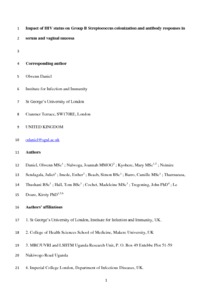Daniel, OE;
Nalwoga, J;
Kyohere, M;
Nsimire Sendagala, J;
Imede, E;
Beach, S;
Barro, C;
Tharmarasa, T;
Hall, T;
Cochet, M;
et al.
Daniel, OE; Nalwoga, J; Kyohere, M; Nsimire Sendagala, J; Imede, E; Beach, S; Barro, C; Tharmarasa, T; Hall, T; Cochet, M; Tregoning, J; Le Doare, K
(2025)
Impact of HIV Status on Group B Streptococcus Colonization and Antibody Responses in Serum and Vaginal Mucosa.
The Pediatric Infectious Disease Journal, 44 (2S).
S46-S48.
ISSN 0891-3668
https://doi.org/10.1097/INF.0000000000004659
SGUL Authors: Daniel, Olwenn Elea
![[img]](https://openaccess.sgul.ac.uk/116943/1.hassmallThumbnailVersion/Final%20-%20Impact%20of%20HIV%20status%20on%20Group%20B%20Streptococcus.pdf)  Preview |
|
PDF
Accepted Version
Available under License ["licenses_description_publisher" not defined].
Download (489kB)
| Preview
|
Abstract
Background:
Group B streptococcus (GBS) is a commensal bacterium of the digestive and genital tracts that can occasionally cause maternal and neonatal disease. GBS is particularly a burden in low-resource settings, where infections with HIV are also highly prevalent. This study investigates the impact of HIV status on GBS colonization and antibody levels.
Methods:
In Uganda, 90 nonpregnant women of childbearing age were followed for 3 months. Every 2 weeks, rectal and vaginal swabs were tested for GBS, and vaginal cups and blood were collected for measurement of GBS capsular polysaccharides (CPS) IgG using standardized assays.
Results:
Twenty-six of 90 women were living with HIV. Almost 51/90 women were GBS colonized at 1 or several visits. GBS colonization fluctuated in the rectal and vaginal sites. Most prevalent serotypes were Ia and III, with 33 individuals carrying different serotypes over time. Serum and vaginal CPS-IgG levels were stable over 12 weeks. In serum, for serotypes Ib–V, the geometric mean concentration (GMC) of CPS-IgG did not differ between HIV+ and HIV− participants. However, the GMC for serum CPS-Ia-IgG in the HIV+ group was 2.5 times lower than in the HIV− group (P = 0.038). Vaginal CPS-IgG was measurable in 5/26 (19%) HIV+ participants, and 32/64 (50%) HIV− participants.
Conclusions:
Despite fluctuating GBS colonization, antibody levels remained stable over 12 weeks. The level of CPS-Ia-specific IgG in serum was lower in women with HIV than in those without HIV. Vaginal CPS-specific IgG was not measurable in 81% of individuals with HIV.
Statistics
Item downloaded times since 18 Nov 2024.
Actions (login required)
 |
Edit Item |


